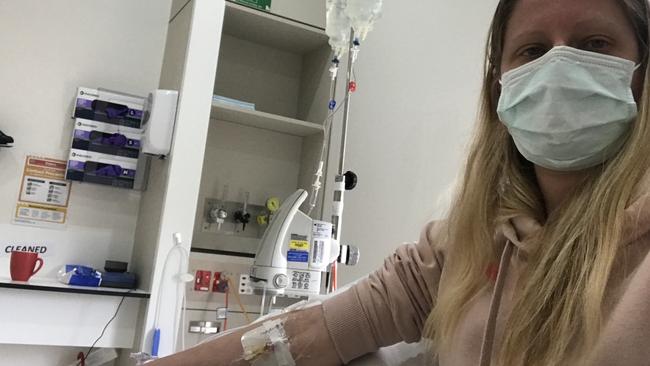How a $95k MS treatment in Mexico would change Mount Gambier’s Sarah McDowell’s life
When part of this South Australian teacher’s body went numb at a school assembly she thought she was having a stroke. But the true cause changed her life.
SA News
Don't miss out on the headlines from SA News. Followed categories will be added to My News.
Sarah McDowell was at a school assembly when the right side of her body went numb.
The Mount Gambier PE teacher believed she was having a stroke when she was taken to hospital but what followed was an unexpected and life changing diagnosis.
Ms McDowell discovered she had relapsing remitting multiple sclerosis in December 2017.
The fitness enthusiast said the “terrifying” diagnosis was “hard being a PE teacher”.
“Being physically active has been my life and what keeps me loving life,” Ms McDowell said.
“By the time I started my treatment I had lost the ability to initiate swallowing, I had extreme heat sensitivity, my bladder gave me only seconds warning to get to the toilet, and the right side of my body was still numb.”
Five years on, Ms McDowell, relapses every four to five months and had exhausted treatment options in Australia that stop the degenerative, incurrable disease from progressing.
But in her flight for a better life the 39-year old discovered a costly treatment that would give her “a future with hope”.

Ms McDowell is on a mission to raise $95k to travel to Mexico for a Autologous Haematopoietic Stem Cell Therapy (AHSCT) – a treatment unavailable to her in Australia.
“I’ve had MS now for five years and I’ve decided I’ve wanted to go and get this bone marrow transplant just to knock it on it’s head and feel like I’ve got a sense of hope again,” she said.
“Otherwise there’s nothing really here that stops the disease, it just slows it down.”
Sarah described AHSCT, on her GoFundMe page, as the “process of harvesting stem cells, killing off the existing immune system through chemotherapy and then placing those cells back into the body to help grow a brand new immune system”.
A 2021 long-term follow up study of AHSCT, from 20 Italian treatment centres, reviewed 210 people who had undergone treatment between 1997 and 2019 – 122 of which had relapsing remitting MS.
The report shows that three people died within 100 days of treatment.
However, five years after treatment, 85.5% of participants with relapsing remitting MS saw no disease progression and 78.1% remained relapse free.
For Ms McDowell the treatment represents a chance at a better quality of life and she hopes to travel to Mexico by the middle of this year.
“This is my chance of a bit of hope of stopping MS and being able to just live a fulfilled and active life,” she said.
“When you’re stuck in the grind of just going to hospitals and treatments all the time, it’s hard to look forward into the future.”

Without AHSCT, Ms McDowell’s diagnosis will eventually advance to secondary progressive MS.
“Then you don’t recover or repair from your lesions and your damage,” she said.
“I can certainly live with what I’ve got now, if I lost the ability to walk or see then that would be the quality of life going downhill massively.”
So far Ms McDowell has raised 15k. To help her stop MS in its tracks donate via




